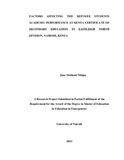| dc.description.abstract | The refugee students in Nairobi, Kenya, face xenophobia and discriminative
urban refugee policies, which preclude their admission into public secondary
schools in the city. In turn, these students’ enrolment in private schools in Nairobi
is hindered by their parents’ or guardians’ precarious socio-economic status. The
study aimed at investigating the factors affecting the performance of refugee
students at KCSE. This study employed descriptive survey. In this study, the
target population consisted of all public secondary schools in Eastleigh North
Division. Eastleigh North Division has 12 public secondary schools that sat for
KCSE examination by the year 2012. The sample size consisted of a total of 388
respondents; 12 head teachers, 12 teachers and 366 students. The sample for the
students consisted of 10 % of the students’ population of 3660 drawn from an
accessible population of students in the public secondary schools. The entire
population of head teachers in the twelve public secondary schools in Eastleigh
North division took part in the study. From each school, there was one class
teacher participating in the study. The class teachers were purposively selected
because they are in close contact with students and they are better placed to give
information on students’ academic performance and class management in the
schools
The study’s findings show that the public secondary schools in Eastleigh Division
provides many Somali refugee students in Nairobi with an opportunity to access
education, and a welcoming and secure learning environment. However, language
barrier, psychological trauma, financial constraints, lack of support from fellow
students as well as teachers and inadequate school resources were found to affect
the academic achievement of the refugee students. Additionally, the students’
deprived livelihoods in the city hamper their achievement to their fullest potential.
Collaboration between agencies such as UNHCR, Kenyan government, and the
urban Somali refugee community has the potential to improve these students’
learning conditions, and their future lives. | en |

